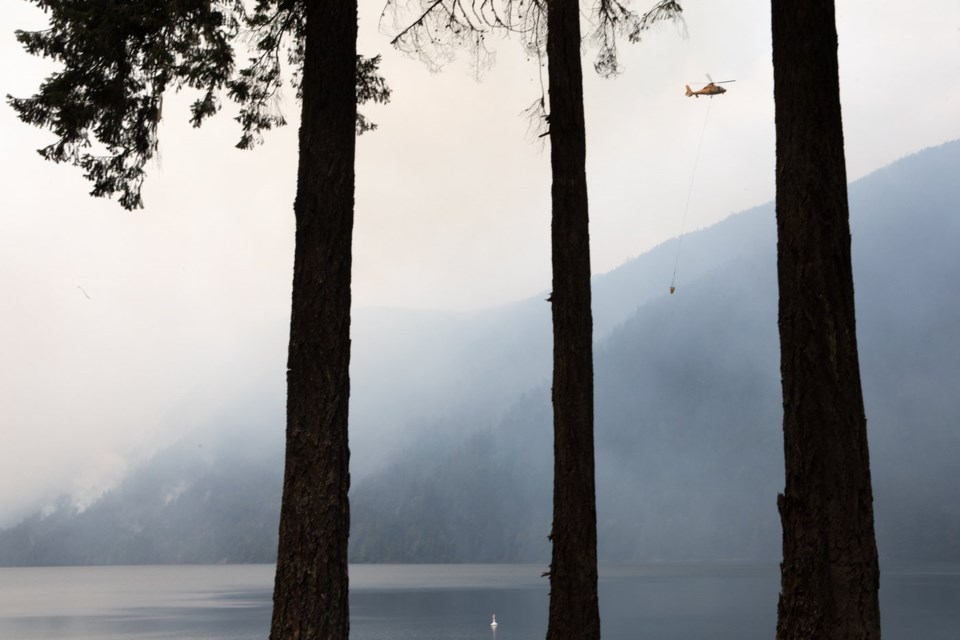Light rain and higher humidity in British Columbia have briefly tempered wildfire activity, but hotter temperatures in the forecast appear poised to create new challenges.
Cliff Chapman, director of wildfire operations with the BC Wildfire Service, said a drying trend starting this weekend is expected to cause the southern half of the province to "heat up again," raising the wildfire risk.
"There is no place in B.C. this year, and frankly, probably any year, that is going to be safe from the threat of wildfires," Chapman told a news conference Wednesday.
"In terms of the rest of August and even into September, I wouldn't say there's anywhere in B.C. that I would say there's no hazard left there."
Chapman said the northeast corner of the province, which has dealt with the brunt of B.C.'s wildfire season for several years, has missed out on rain that's been seen elsewhere and continues to be an area of concern for fire.
And the places that have seen some rain have not seen enough.
"What it does is it resets our conditions, but only at a very micro scale," said Chapman, explaining that the reprieve gives crews a chance to attack fires at their edge.
"It gives us the ability to do that, but it doesn't knock down the hazard for the whole province for the rest of the fire season."
Chapman said recent fire seasons in B.C. have not seen the kind of large "season-ending rain event" that would snuff out the last of the blazes and crews have been left to rely on seasonal shifts from summer to fall and fall to winter.
About 120 wildfires are burning across the province, roughly double the number from last week, when hot and dry weather combined with thousands of lightning strikes to spark dozens of new blazes.
But there have been some gains, with 160 fires declared out in the past week.
In the Fraser Canyon, an evacuation order issued by the Lytton First Nation due to the nearby Cantilever Bar wildfire was rescinded after firefighters reclassified the blaze as being held on Tuesday.
Evacuation alerts issued by the Lytton First Nation, the Thompson-Nicola Regional District and the Siska First Nation were also lifted for areas around the fire.
B.C.'s emergency information agency still showed an active evacuation alert issued by the Skuppah Indian Band. The community could not be reached for an update.
There are approximately 400 homes under evacuation order and 700 under evacuation alert in the province.
The vast majority are related to an out-of-control fire burning on the north shore of Cameron Lake on Vancouver Island, about 60 kilometres from Nanaimo.
Firefighters have said the cooler weather was helping their efforts.
Fire information officer Madison Dahl said there was "very little" fire activity near residences in the area of Wesley Ridge and the West Cameron Lake, as night-vision helicopters monitored the fire throughout the evening.
Dahl said about 1.4 millimetres of rain fell on the fire on Tuesday, and groundcrews have been taking advantage of cooler conditions to battle the blaze.
"They've made excellent progress in suppressing fire activity in residential areas," said Dahl, adding that 185 firefighters have been working to contain the flames.
She said the fire is suspected to be human-caused, which is now under investigation.
Douglas Holmes, director of the emergency operations centre for the Regional District of Nanaimo, said as of Tuesday, 387 residences are on evacuation order, including the Little Qualicum Falls Campground, and meanwhile, 250 residences are on evacuation alert.
But Holmes said some evacuees are expected to return home soon, as the district will release a full list of addresses later Wednesday.
"Once we update those orders and alert areas to allow some of the residents to return to their homes, we will update these numbers," said Holmes, "We have a keen focus on trying to get everybody back."
Environment Canada's forecast for the region predicts daytime highs of 29 C on Saturday and 33 C on Sunday.
Emergency Management Minister Kelly Greene encouraged people to stay alert and prepared during the fire season, saying that includes having a household emergency plan.
"We know that we still have challenging weeks ahead for this year's wildfire season and the province remains committed to supporting people," she told Wednesday's news conference.
— With files from Nono Shen
This report by The Canadian Press was first published Aug. 6, 2025.
Chuck Chiang and Ashley Joannou, The Canadian Press



